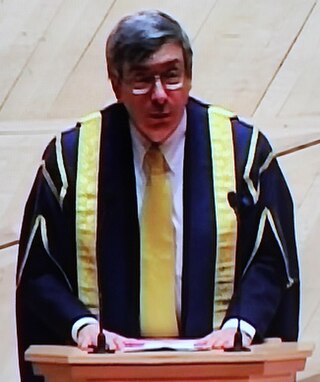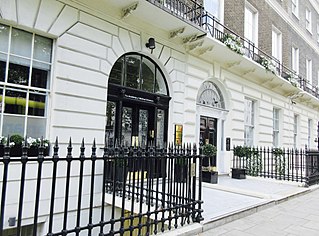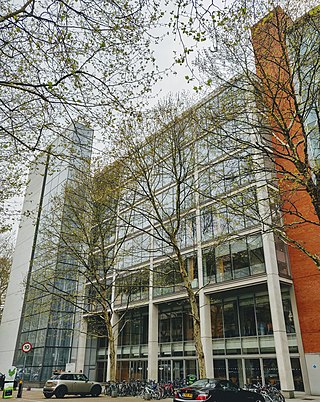- University of Cambridge
(Peterhouse) - Imperial College London
(Royal School of Mines) - King's College London
(Bush House) - University of Oxford
(Balliol College) - Queen Mary University of London
(The Queens' Building) - University College London
(Wilkins Building)
Related Research Articles

Imperial College London is a public research university in London, England. Its history began with Prince Albert, consort of Queen Victoria, who developed his vision for a cultural area that included the Royal Albert Hall, the Victoria and Albert Museum, the Natural History Museum and several royal colleges. In 1907, Imperial College London was established by royal charter, unifying the Royal College of Science, the Royal School of Mines and the City and Guilds of London Institute. In 1988, the Imperial College School of Medicine was formed by merging with St Mary's Hospital Medical School. In 2004, Queen Elizabeth II opened the Imperial College Business School.

King's College London is a public research university located in London, England. King's was established by royal charter in 1829 under the patronage of King George IV and the Duke of Wellington. In 1836, King's became one of the two founding colleges of the University of London. It is one of the oldest university-level institutions in England. In the late 20th century, King's grew through a series of mergers, including with Queen Elizabeth College and Chelsea College of Science and Technology, the Institute of Psychiatry, the United Medical and Dental Schools of Guy's and St Thomas' Hospitals and the Florence Nightingale School of Nursing and Midwifery.

Cancer Research UK (CRUK) is the world's largest independent cancer research organisation. It is registered as a charity in the United Kingdom and Isle of Man, and was formed on 4 February 2002 by the merger of The Cancer Research Campaign and the Imperial Cancer Research Fund. Cancer Research UK conducts research using both its own staff and grant-funded researchers. It also provides information about cancer and runs campaigns aimed at raising awareness and influencing public policy.

The Medical Research Council (MRC) is responsible for co-coordinating and funding medical research in the United Kingdom. It is part of United Kingdom Research and Innovation (UKRI), which came into operation 1 April 2018, and brings together the UK's seven research councils, Innovate UK and Research England. UK Research and Innovation is answerable to, although politically independent from, the Department for Business, Energy and Industrial Strategy.

Sir Richard Hughes Trainor,, is an academic administrator and historian who served as the Principal of King's College London from 2004 to 2014. He was previously the Vice-Chancellor of the University of Greenwich from 2000 to 2004. He is currently Rector (head) of Exeter College, Oxford.

Lionel Tarassenko, is a British engineer and academic, who is a leading expert in the application of signal processing and machine learning to healthcare. Tarassenko is President of Reuben College, Oxford.
Translational medicine develops the clinical practice applications of the basic science aspects of the biomedical sciences; that is, it translates basic science to applied science in medical practice. It is defined by the European Society for Translational Medicine as "an interdisciplinary branch of the biomedical field supported by three main pillars: benchside, bedside, and community". The goal of translational medicine is to combine disciplines, resources, expertise, and techniques within these pillars to promote enhancements in prevention, diagnosis, and therapies. Accordingly, translational medicine is a highly interdisciplinary field, the primary goal of which is to coalesce assets of various natures within the individual pillars in order to improve the global healthcare system significantly.

The Academy of Medical Sciences is an organisation established in the UK in 1998. It is one of the four UK National Academies, the others being the British Academy, the Royal Academy of Engineering and the Royal Society.
The golden triangle is the triangle formed by the university cities of Cambridge, London, and Oxford in the south east of England in the United Kingdom. The triangle is occasionally referred to as the Loxbridge triangle, a portmanteau of London and Oxbridge or, when limited to five members, the G5.

Ara Warkes Darzi, Baron Darzi of Denham, is an Armenian-British surgeon, academic, and politician.
UCLPartners is an academic health science centre located in London, England. It is the largest academic health science centre in the world, treats more than 1.5 million patients each year, has a combined annual turnover of around £2 billion and includes around 3,500 scientists, senior researchers and consultants.
Sir Edward Byrne is a neuroscientist who served as Principal of King's College London from August 2014 until January 2021. He was previously Vice-Chancellor of Monash University.
The National Institute for Health and Care Research (NIHR) is the British government’s major funder of clinical, public health, social care and translational research. With a budget of over £1.2 billion in 2020–21, its mission is to "improve the health and wealth of the nation through research". The NIHR was established in 2006 under the government's Best Research for Best Health strategy, and is funded by the Department of Health and Social Care. As a research funder and research partner of the NHS, public health and social care, the NIHR complements the work of the Medical Research Council. NIHR focuses on translational research, clinical research and applied health and social care research.

The Faculty of Medicine is the academic centre for medical and clinical research and teaching at Imperial College London. It contains the Imperial College School of Medicine, which is the college's undergraduate medical school.
The pharmaceutical industry in the United Kingdom directly employs around 73,000 people and in 2007 contributed £8.4 billion to the UK's GDP and invested a total of £3.9 billion in research and development. In 2007 exports of pharmaceutical products from the UK totalled £14.6 billion, creating a trade surplus in pharmaceutical products of £4.3 billion.
Donal Donat Conor Bradley is the Vice President for Research at King Abdullah University of Science and Technology (KAUST), Saudi Arabia. From 2015 until 2019, he was head of the Mathematical, Physical and Life Sciences Division of the University of Oxford and a Professor of Engineering Science and Physics at Jesus College, Oxford. From 2006 to 2015, he was the Lee-Lucas Professor of Experimental Physics at Imperial College London. He was the founding director of the Centre for Plastic Electronics and served as vice-provost for research at the college.

Sir Mark Jeremy Walport is an English medical scientist and was the Government Chief Scientific Adviser in the United Kingdom from 2013 to 2017 and Chief Executive of UK Research and Innovation (UKRI) from 2017 to 2020. In 2023 he became the Foreign Secretary of The Royal Society.
Professor Dame Lesley Jean Fallowfield DBE is a British cancer psychologist and a professor of psycho-oncology at the University of Sussex. The main outcomes of her research have been the establishment of assessment tools to measure quality of life in clinical trials of cancer patients and the design of educational programmes to improve oncologists' communication with their patients.

Robert E. MacLaren FMedSci FRCOphth FRCS FACS VR is a British ophthalmologist who has led pioneering work in the treatment of blindness caused by diseases of the retina. He is Professor of Ophthalmology at the University of Oxford and Honorary Professor of Ophthalmology at the UCL Institute of Ophthalmology. He is a Consultant Ophthalmologist at the Oxford Eye Hospital. He is also an Honorary Consultant Vitreo-retinal Surgeon at the Moorfields Eye Hospital. MacLaren is an NIHR Senior Investigator, or lead researcher, for the speciality of Ophthalmology. In addition, he is a member of the research committee of Euretina: the European Society of Retina specialists, Fellow of Merton College, in Oxford and a Fellow of the Higher Education Academy.

Sir Graham Thornicroft is a British psychiatrist, researcher and Professor of Community Psychiatry at the Centre for Global Mental Health and Centre for Implementation Science at King's College London. He also a Consultant Psychiatrist working at a community mental health team at the South London and Maudsley NHS Foundation Trust. He is best known for his work on community mental health services, stigma and discrimination, and global mental health. He has published over 30 books, and has written over 670 peer-reviewed scientific papers. Graham was made a Knight Bachelor in the 2017 Queen's Birthday Honours for services to mental health.
References
- ↑ "Members | GMEC - Global Medical Excellence Cluster - Biomedical Innovation, Improved Patient Outcomes". Archived from the original on 2015-06-29. Retrieved 2015-10-14.
- ↑ "Home". gmecuk.com.
- ↑ "The Rare Diseases Consortium: Partnership and progress in rare diseases | Pfizer: The world's largest research-based pharmaceutical company". Archived from the original on 2014-10-09. Retrieved 2015-10-14.
- ↑ "Key Imperial staff visit Downing Street to discuss creating Global Medical Excellence Cluster | Imperial News | Imperial College London".
- ↑ "News".
- ↑ "Universities | GMEC - Global Medical Excellence Cluster - Biomedical Innovation, Improved Patient Outcomes". Archived from the original on 2015-09-24. Retrieved 2015-10-14.
- ↑ "Pfizer announces research tie-up with UK universities".
- ↑ "Plans for a world-class medical hub call for a different mindset". TheGuardian.com . 19 December 2006.
- ↑ "Members | GMEC - Global Medical Excellence Cluster - Biomedical Innovation, Improved Patient Outcomes". Archived from the original on 2015-06-29. Retrieved 2015-10-14.
- ↑ "Partners | GMEC - Global Medical Excellence Cluster - Biomedical Innovation, Improved Patient Outcomes". Archived from the original on 2015-06-29. Retrieved 2015-10-14.
- ↑ "Prime Minister's life sciences speech".
- ↑ "House of Commons - Science and Technology: Written evidence submitted by the Shelford Group".





